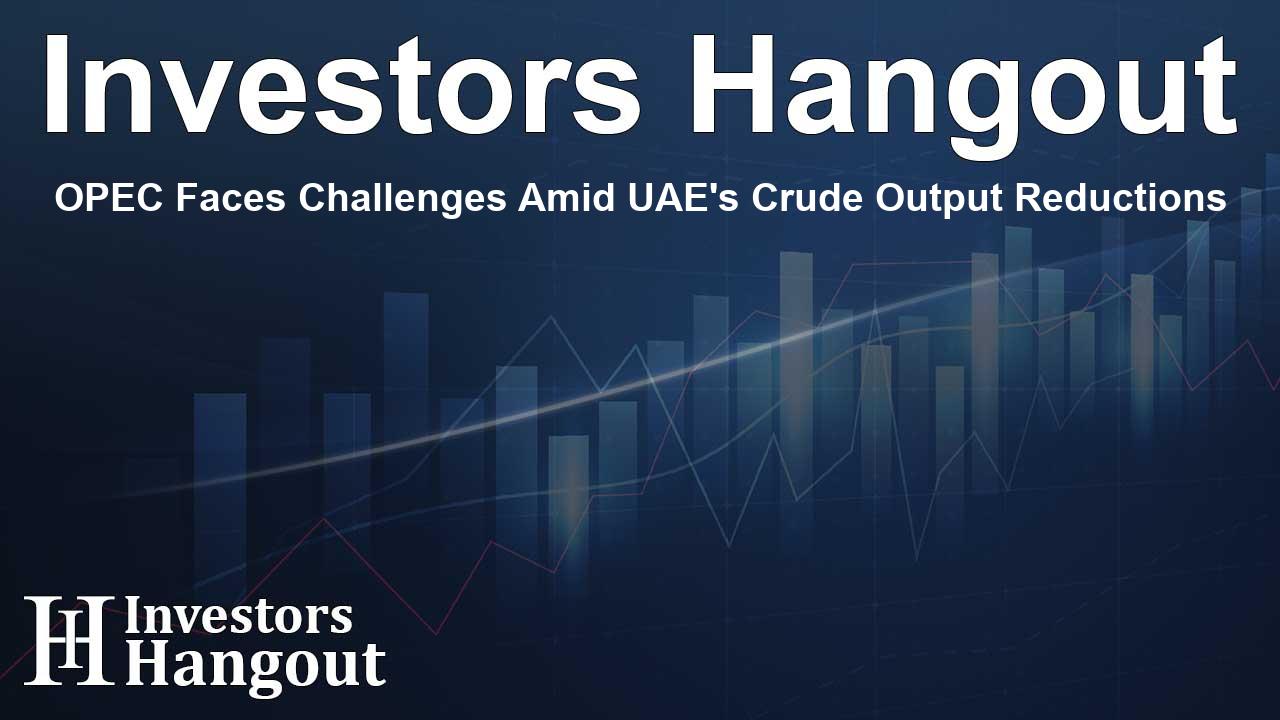OPEC Faces Challenges Amid UAE's Crude Output Reductions

OPEC's Recent Cuts in Crude Production
Recently, OPEC announced a decline in its crude oil production, a situation largely influenced by significant cutbacks from the United Arab Emirates (UAE). The overall production dropped by 120,000 barrels per day, bringing the total to 27.05 million barrels per day. This decision is a strategic move by the UAE aimed at strengthening the oil market through controlled supply reductions.
Global Adjustments in Oil Production
While OPEC's overall production faced a decrease, slight increases in output from Libya and Nigeria helped balance the equation momentarily. However, reductions from Iran and Kuwait erased these gains, showing how interconnected the organization's nations are in terms of production and supply. With Saudi Arabia leading the charge, OPEC has been proactively managing crude outputs over the years to stabilize prices amid unpredictable demand and a surge in supply from the United States.
Ongoing Production Strategies
In a bid to keep the oil market in check, OPEC and its partners have recently decided to hold off on reintroducing previously suspended production levels. This collective decision is part of a continued effort to control market dynamics. Yet, adherence to the set output limits varies among member countries, highlighting the challenges faced by the organization. While data indicates Abu Dhabi is sticking to its allocated production quota, alternative evaluations suggest the UAE may have surpassed its intended production targets.
The Future of OPEC's Production Plans
As OPEC navigates the complexities of the global oil landscape, it continues to adapt its strategies for achieving a delicate balance between supply and demand. With external producers also impacting the market, the organization must remain vigilant. The shifts in production levels are part of a broader goal to overcome market challenges and ensure sustainability in oil pricing.
The Impact of External Factors
The interplay of various external factors contributes significantly to OPEC's decisions on production levels. From geopolitical tensions to shifting economic conditions, the organization must evaluate a wide array of influences that could disrupt the market. This ability to adjust and respond becomes crucial in maintaining the stability of global oil prices.
Frequently Asked Questions
What led to the recent decrease in OPEC's crude production?
The recent decrease was mainly due to cutbacks in production from the UAE, which aimed to support the global oil market.
How does UAE's production cut impact the global oil market?
The UAE's reduction assists in balancing supply and demand on a global scale, potentially helping to stabilize oil prices.
Are other OPEC nations increasing their production levels?
Yes, Libya and Nigeria have slightly increased their output; however, this has been offset by reductions in Iran and Kuwait.
What is OPEC's overall strategy regarding production adjustments?
OPEC's strategy involves managing output to address fluctuations in oil demand and to counteract external oil production pressures.
Will OPEC continue its production cuts in the future?
OPEC's decisions will depend on market conditions, but they have shown a willingness to adjust production levels as necessary to maintain stability.
About The Author
Contact Ryan Hughes privately here. Or send an email with ATTN: Ryan Hughes as the subject to contact@investorshangout.com.
About Investors Hangout
Investors Hangout is a leading online stock forum for financial discussion and learning, offering a wide range of free tools and resources. It draws in traders of all levels, who exchange market knowledge, investigate trading tactics, and keep an eye on industry developments in real time. Featuring financial articles, stock message boards, quotes, charts, company profiles, and live news updates. Through cooperative learning and a wealth of informational resources, it helps users from novices creating their first portfolios to experts honing their techniques. Join Investors Hangout today: https://investorshangout.com/
The content of this article is based on factual, publicly available information and does not represent legal, financial, or investment advice. Investors Hangout does not offer financial advice, and the author is not a licensed financial advisor. Consult a qualified advisor before making any financial or investment decisions based on this article. This article should not be considered advice to purchase, sell, or hold any securities or other investments. If any of the material provided here is inaccurate, please contact us for corrections.
